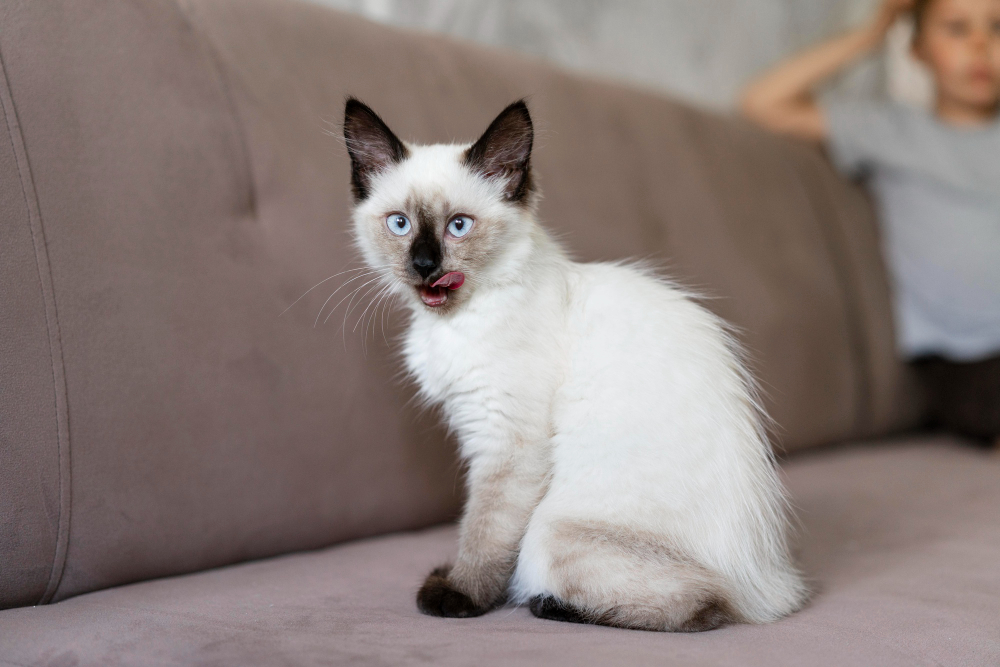Birman cats are known for their striking blue eyes, silky coats, and affectionate personalities. These gentle felines thrive on human companionship and require special care to maintain their health and well-being. Their luxurious fur, while not prone to matting like some long-haired breeds, still requires regular brushing to keep it soft and tangle-free. Birman cats are also highly social and do not like being left alone for long periods, making them ideal companions for individuals or families who can give them plenty of attention. Additionally, they are prone to certain genetic health conditions, such as hypertrophic cardiomyopathy and kidney disease, which makes regular veterinary check-ups essential. This guide covers the essentials of Birman cat care, Birman cat grooming, and Birman cat health issues to ensure your feline companion stays happy and healthy.
Brushing at least 2–3 times a week helps prevent tangles, and occasional bathing every few months maintains their coat.
Yes, Birmans are affectionate, gentle, and great with families, including children and other pets.
Health issues include heart disease (HCM), kidney disease, obesity, and dental problems.
A: Monitor portion sizes, provide a balanced diet, and engage them in regular play to maintain a healthy weight.
Table of Contents
ToggleUnderstanding Birmans Care
Owning a Birman involves more than just providing food and shelter. They require special attention to their diet, grooming, and overall well-being. Below are key aspects to focus on when taking care of your pet.
Birman Characteristics Table
Height
8–10 inches
Weight
6–12 pounds
Lifespan
12–16 years
Shed Level
Moderate
Temperament
Affectionate, social, gentle
Energy Level
Moderate, enjoys interaction
Coat Type
Medium-length, silky, requires regular grooming
Eye Colors
Blue
Vocalization
Soft and gentle, not overly vocal
Intelligence
High, enjoys companionship and play
Common Health Concerns
Heart disease, kidney disease, obesity, dental problems
Height
8–10 inches
Weight
6–12 pounds
Lifespan
12–16 years
Shed Level
Moderate
Temperament
Affectionate, social, gentle
Energy Level
Moderate, enjoys interaction
Coat Type
Medium-length, silky, requires regular grooming
Eye Colors
Blue
Vocalization
Soft and gentle, not overly vocal
Intelligence
High, enjoys companionship and play
Common Health Concerns
Heart disease, kidney disease, obesity, dental problems
What to Feed a Birman Cat
A well-balanced diet is essential for a Birman cat’s health. High-quality, protein-rich food is crucial for maintaining their energy levels and overall well-being. Due to their moderate activity level, they require a nutrient-dense diet with appropriate protein and fat content.
How Much Should You Feed a Birman Cat?
They should be fed according to their age, weight, and activity levels. Generally, adult Birmans require around 200–300 calories per day, divided into two or three meals. Since they have a tendency to gain weight, portion control is essential.
Nutritional Tips
- Choose high-quality food with real meat as the primary ingredient.
- Incorporate omega-3 and omega-6 fatty acids to promote a healthy skin and coat.
- Ensure proper hydration by providing fresh water daily and supplementing with wet food if needed.
- Avoid artificial additives and excessive carbohydrates to prevent weight gain and digestive issues.

The Importance of Birman Cat Grooming
One of the most significant aspects of Birman breed is maintaining their soft, silky coat. Birman cat grooming should be part of your routine to prevent matting and hairballs.
1. Brushing and Combing
Using a high-quality metal comb and a slicker brush will help remove loose hair and keep their coat smooth and healthy. Brushing at least 2–3 times a week is essential to prevent tangles and keep shedding under control.
2. Regular Bathing
Birmans do not require frequent baths, but an occasional bath every few months can help remove dirt and excess oils. Use a gentle, cat-safe shampoo and ensure thorough drying.
3. Eye and Face Cleaning
Birman cats have minimal tear staining, but regular eye cleaning helps prevent dirt buildup. Use a soft, damp cloth to wipe around their eyes and face gently.
4. Nail Trimming and Ear Cleaning
Regular nail trimming prevents overgrowth and accidental scratches. Additionally, cleaning their ears with a vet-approved solution helps prevent infections and wax buildup.
Birman Cat Health Issues
Despite their robust nature, Birman cats are prone to some genetic and environmental health conditions. Birman cat health issues should be monitored carefully to prevent complications.

1. Hypertrophic Cardiomyopathy (HCM)
HCM is a common heart disease in cats, and Birmans are at risk. This condition causes thickening of the heart muscles, leading to reduced heart function. Routine vet check-ups and echocardiograms help in early detection and management.
2. Kidney Disease
Chronic kidney disease (CKD) is a concern in older Birmans. Providing a hydration-rich diet with quality wet food and regular vet screenings can help detect and manage kidney issues early.
3. Obesity
Birman cats have a tendency to gain weight if their diet and activity levels are not properly managed. Providing portion-controlled meals and engaging them in interactive play can help maintain a healthy weight.
4. Dental Problems
Birmans are prone to dental diseases, including gingivitis and periodontal disease. Poor oral hygiene can lead to infections and discomfort. Regular brushing, dental treats, and professional cleanings help maintain oral health.
Behavior and Training Tips
Birman cats are affectionate and thrive on companionship. Here are some training and behavioral tips:
- Use positive reinforcement when training them to use a litter box or scratch post.
- Provide cozy resting spots, as Birmans enjoy lounging and staying close to their owners.
- Establish a routine for feeding and grooming to build trust and consistency.
- Engage them in interactive play using feather wands and puzzle feeders to keep them entertained.
Fun Activities for Birman Cats
Birmans are playful but also enjoy relaxation. Here are some ways to keep them engaged:
- Puzzle feeders to encourage problem-solving skills.
- Feather wands and laser pointers to stimulate their hunting instincts.
- Cat trees and scratching posts for climbing and exercise.
- Interactive toys and cozy napping spots to keep them active indoors.
Owning a Birman cat is a rewarding experience, but it requires commitment. With proper Birman cat care, Birman cat grooming, and awareness of Birman cat health issues, you can ensure a long, happy, and healthy life for your beloved feline companion.







